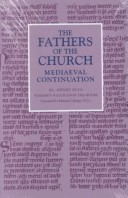Mediaeval Continuation
1 total work
Written by Dominican preacher and mystic Bl. Henry Suso (c.1300-1366), "Horologium Sapientiae", or "Wisdom's Watch upon the Hours", was one of the most successful religious writings of its time. Now it is offered to the English-speaking world in a new translation based on Pius Kunzle's critical Latin edition. Essentially...Read more
Written by Dominican preacher and mystic Bl. Henry Suso (c.1300-1366), "Horologium Sapientiae", or "Wisdom's Watch upon the Hours", was one of the most successful religious writings of its time. Now it is offered to the English-speaking world in a new translation based on Pius Kunzle's critical Latin edition. Essentially a dialogue between the author and Divine Wisdom, the text tells of Suso's service to and espousal of Wisdom, his "most cruel bride". Readers esteemed it for its devotional fervour and for the solutions Suso offers to the problems inseparable from a sincere Christian life. He teaches that a devotion of sharing in the Saviour's self-sacrifice is the path to spiritual perfection, as well as a consolation for the soul amid life's cares. Based on his own shrewd observations on shunning "sensory forms and earthly imaginings", Suso develops the essential elements of ascetic and mystical theology. Suso keenly observes and judiciously criticizes the abuses of his own times and the rise of secularism, hedonism and materialism. He writes of his yearning for a way of life that was fast disappearing, for the piety and simplicity of the country folk he had known as a boy.
For Suso, the "Christocentric Boethius", the men and women of his youth, were heirs of the Eternal Wisdom, founded on Christ and found in Christ, which was being lost and forgotten in the new urban cultures. The text's autobiographical content should interest those who follow the repercussions of the condemnation of Meister Eckhart, Suso's revered teacher, in 1329. Eckhart had been condemned for heresy, and Suso uses allegory to show perceptive readers how he found a way to dissent from this judgement and yet remain the Holy See's loyal and faithful servant. Throughout most of his life, Suso suffered the jealously of his confreres and remained ever conscious of the dangers of uncritically applying Eckhart's principles; these troubles too are expressed allegorically here. "Wisdom's Watch upon the Hours" marks the joys and triumphs gained from following the Lord's suffering.
For Suso, the "Christocentric Boethius", the men and women of his youth, were heirs of the Eternal Wisdom, founded on Christ and found in Christ, which was being lost and forgotten in the new urban cultures. The text's autobiographical content should interest those who follow the repercussions of the condemnation of Meister Eckhart, Suso's revered teacher, in 1329. Eckhart had been condemned for heresy, and Suso uses allegory to show perceptive readers how he found a way to dissent from this judgement and yet remain the Holy See's loyal and faithful servant. Throughout most of his life, Suso suffered the jealously of his confreres and remained ever conscious of the dangers of uncritically applying Eckhart's principles; these troubles too are expressed allegorically here. "Wisdom's Watch upon the Hours" marks the joys and triumphs gained from following the Lord's suffering.
